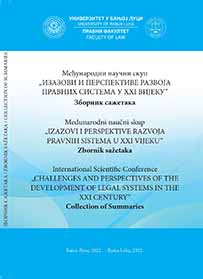TECHNOLOGICAL PROGRESS AS A CHALLENGE TO THE DEVELOPMENT OF LAW DIRECTIONS AND PERSPECTIVES FOR THE 21ST CENTURY
TECHNOLOGICAL PROGRESS AS A CHALLENGE TO THE DEVELOPMENT OF LAW DIRECTIONS AND PERSPECTIVES FOR THE 21ST CENTURY
Author(s): Csaba VargaSubject(s): Law, Constitution, Jurisprudence, Civil Law, Philosophy of Law
Published by: Правни факултет Универзитета у Бањој Луци
Keywords: Normality; legal principles and social-technological preconditions; law as instrumental value; autopoiesis; ’order out of chaos’;
Summary/Abstract: Socio-technological development can bring not only step-by-step progress, but also leaps and bounds that can go beyond the conditions in which law has operated in modernity or even in the habits of millennia. Even prevailing basic legal principles may need reformulation then. One, how to react if, by inventing easy-to-use facilities, personality can be manipulated, programmed, changed all through? If abortion can be achieved through organic regression? If undetectable arms can be developed with long delayed or far reaching effect? If chemical, radioactive or cyber warfare is made available on a mass scale as operated by anyone in isolation with no chance of identificaton? If life expectations of human groups can be worsened or changed? Two, how law reacts, if it will be given multiplied presence, global level of orderliness with technics intensifying scope and depth of regulation? Three, changes in law may occur as a consequence of changes in the way humans are organized into society and the technology by which their conduct is influenced. Information technology will be enabled to process millions of opinions and call masses for public actions, with civil society superseding politically organised society. Four, as to new paradigms, investigation into individual factors chains of causality is replaced by a vision built on the average of what can be experienced in statistic masses and probabilities. Processes are autopoietic in so far as the coordinates of ongoing operations are defined through the operational process itself, individually for each case. The idea ’order out of chaos’ is the new explanatory principle for the field of law as well.
Journal: Зборник радова Међународни научни скуп „Изазови и перспективе развоја правних система у XXI вијеку"
- Issue Year: 2022
- Issue No: 2
- Page Range: 139-146
- Page Count: 8
- Language: English

